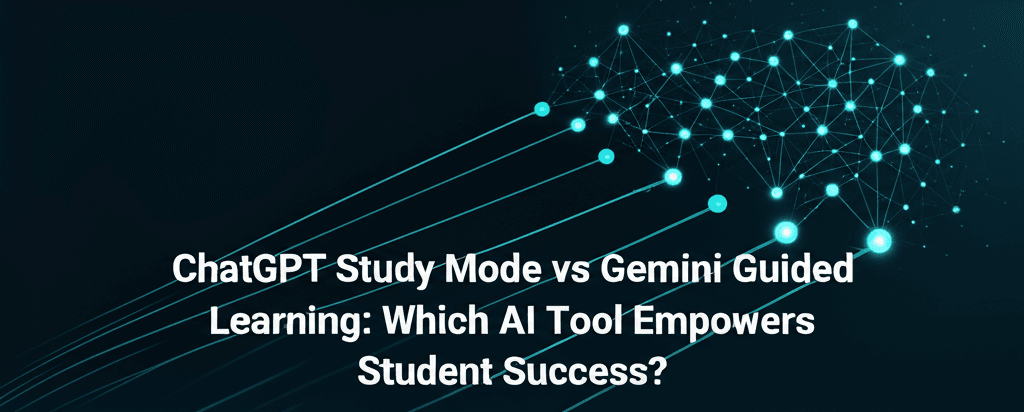Artificial intelligence is reshaping education, offering students new ways to master complex subjects with unprecedented efficiency. Among the most prominent tools transforming study habits are ChatGPT’s Study Mode and Google Gemini’s Guided Learning. These platforms leverage advanced AI to personalize learning, but their approaches differ significantly. Let’s explore their unique features, strengths, and ideal use cases to help students determine which solution aligns best with their academic needs.
Understanding ChatGPT’s Study Mode
ChatGPT’s Study Mode represents a flexible, conversational approach to AI-powered learning. This feature enables students to engage in dynamic dialogues where the AI responds to open-ended queries, explains concepts in multiple ways, and adapts explanations based on follow-up questions. Key advantages include its ability to break down complex topics into digestible explanations, provide instant feedback on understanding, and generate practice questions tailored to specific study materials.
Students particularly benefit from the tool’s contextual awareness, which allows for continuous conversations about interrelated topics without losing the thread of discussion. The system’s strength lies in handling unexpected questions and exploring niche academic areas that might not be covered in traditional curricula. However, users should verify critical information from authoritative sources, as the platform’s open-ended nature can occasionally lead to hallucinated content in specialized subjects.
Exploring Gemini’s Guided Learning
Google Gemini takes a more structured approach through its Guided Learning system. This pathway-based solution creates customized learning journeys with defined milestones, curated resources, and progressive difficulty levels. The platform integrates Google’s vast knowledge graph and academic databases to recommend verified study materials, video explanations, and practice exercises sequenced for optimal knowledge retention.
Gemini excels in providing comprehensive learning roadmaps, particularly for standardized subjects like mathematics, computer science, and language learning. The system automatically adjusts content difficulty based on performance and identifies knowledge gaps through diagnostic quizzes. Visual learners appreciate Gemini’s strong integration with diagrams, charts, and multimedia resources from trusted educational sources.
Critical Feature Comparison
When evaluating these platforms, consider these key differentiators:
1. Learning Structure: ChatGPT offers free-form exploration ideal for curiosity-driven learning, while Gemini provides scaffolded pathways better suited for exam preparation.
2. Resource Integration: Gemini directly incorporates educational materials from academic databases and publishers, whereas ChatGPT generates original explanations based on its training data.
3. Assessment Capabilities: Both offer practice questions, but Gemini’s tie directly to learning objectives, while ChatGPT’s questions adapt dynamically to conversation context.
4. Multi-Modal Learning: Gemini currently supports richer media integration with images and diagrams, though ChatGPT continues expanding its multi-modal capabilities.
5. Personalization: ChatGPT excels at adapting to unconventional questions, while Gemini personalizes based on demonstrated knowledge levels.
Integration with Study Techniques
Effective use of either platform requires strategic implementation. ChatGPT shines when paired with active recall techniques using prompt templates like “Explain [concept] then quiz me with increasingly difficult questions.” Gemini integrates seamlessly with spaced repetition systems through its scheduled review recommendations. Both platforms can generate flashcards when requested, though Gemini automates this process within its learning pathways.
For research-intensive projects, ChatGPT assists with brainstorming and source synthesis, while Gemini’s citation features help locate primary references. Students preparing for standardized tests often prefer Gemini’s curriculum-aligned structure, whereas those pursuing independent research benefit from ChatGPT’s flexibility in exploring interdisciplinary connections.
Maximizing Effectiveness and Safety
To optimize results with either tool, students should use specific prompting techniques. Instead of “Explain physics,” try “Create a 15-minute study plan for Newton’s Laws with real-world examples and common misconceptions.” Cross-verify critical information, especially for emerging scientific concepts or historical interpretations. Both platforms implement academic integrity safeguards that discourage inappropriate use while still supporting legitimate learning enhancement.
Emerging capabilities like ChatGPT’s memory features and Gemini’s notebook integration enable long-term progress tracking. Students using these tools report 30-50% reductions in study time for concept mastery, though individual results vary based on implementation quality.
Future Developments and Considerations
As both platforms evolve, Gemini is expanding its simulation capabilities for scientific experiments, while ChatGPT is developing more sophisticated tutoring personalities. Students should periodically reevaluate these tools as new features emerge. The ideal choice depends on individual learning preferences structured versus exploratory approaches, subject matter requirements, and specific academic goals.
Successful implementation involves treating these AI tools as intelligent study partners rather than answer generators. Learners who maintain critical thinking skills while leveraging these technologies develop stronger metacognitive abilities, positioning themselves for success in increasingly AI-augmented educational environments.

Leave a Reply